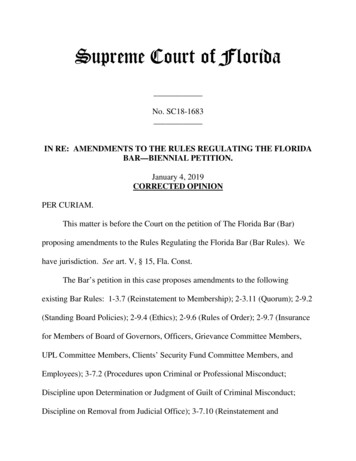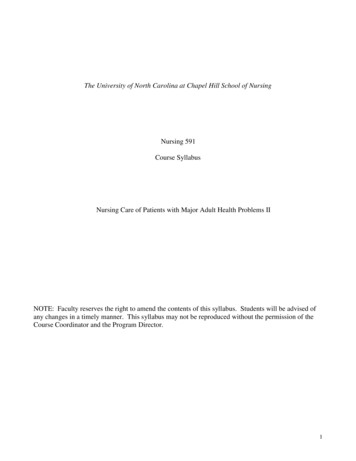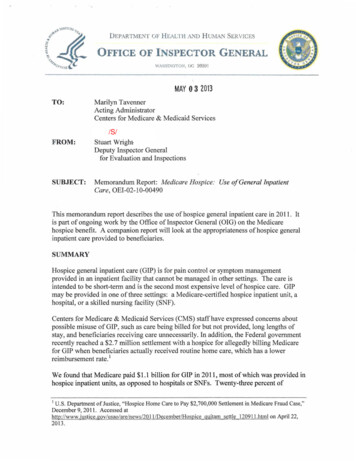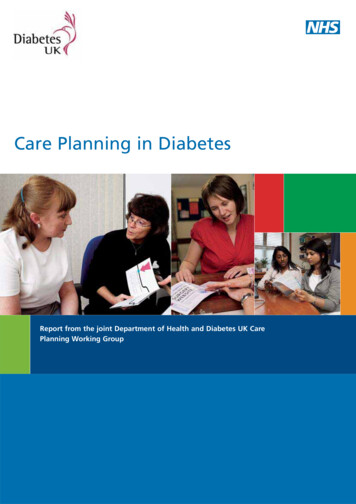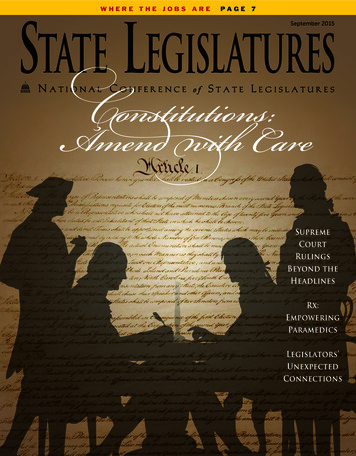
Transcription
WHERETHEJOBSAREPAGE7September 2015 onstitutions:Amend with CareSupremeCourtRulingsBeyond nexpectedConnections
America’s Diabetes Challenge: Get to Your Goals is a program from Merck and theAmerican Diabetes Association that urges people with type 2 diabetes to pledge to workwith their doctor to set their individual A1C goal and maintain it. Through the program,people can also learn if they are at risk for hypoglycemia and how to help reduce thatrisk. The program encourages friends and caregivers to help support the nearly 30million Americans living with diabetes by challenging their loved ones to take the pledge.“I’ve seen first-hand how type 2 diabetes impacts Americansfrom all walks of life. It’s affected my family, friends andfans. I’m a strong believer in making healthy choices, so I’mencouraging all Americans to join me and challenge theirfamily and friends with diabetes to work with their doctor toget to their A1C goal. Together, we can make a difference.”- TIM MCGRAWTIM McGRAWVisit AmericasDiabetesChallenge.comto pledge and for helpful resources and tips.Copyright 2015 Merck Sharp & Dohme Corp., a subsidiary of Merck & Co., Inc. All rights reserved. DIAB-1145933-0000 (04/15)Printed in USA. Minimum 10% Recycled Paper
A National Conferenceof State LegislaturesPublicationSEPTEMBER 2015VOL. 41 NO. 8 CONTENTSExecutive DirectorWilliam T. PoundDirector ofCommunicationsKaren HansenEditorJulie LaysAssistant EditorKevin FrazziniNCSL’s national magazine of policy and politicsContributing EditorJane Carroll AndradeCommunications InternZita TothWeb EditorsEdward P. SmithMark WolfFEATURESDEPARTMENTSSHORT TAKES ON NCSL NEWS PAGE 4Copy EditorLeann StelzerAdvertising SalesManagerLeAnn Hoff(303) 364-7700STATESTATS PAGE 7Where the Jobs AreContributorsKate BlackmanDoug FarquharSusan Parnas FrederickSuzanne HultinLaura ToblerNEWSMAKERS PAGE 8Insight into what’s happeningunder the domesArt DirectorBruce HoldemanNCSL OfficersPresidentSenator Curt BramblePresident Pro Tempore, Utah 2015 BRUCE HOLDEMANPresident-ElectSenator Mike GronstalMajority Leader, IowaStaff ChairKarl AroExecutive Director,Department of LegislativeServices, MarylandDenver Office7700 East First PlaceDenver, Colorado 80230(303) 364-7700Washington, D.C. Office444 North Capitol Street,N.W.Suite 515Washington, D.C. 20001(202) 624-5400Websitewww.ncsl.org/magazineState Legislatures(ISSN 0147-0641), thenational magazine of policyand politics, is publishedmonthly by the NationalConference of StateLegislatures exceptJuly/August and October/November, which arecombined. Postmaster: Sendaddress changes to: StateLegislatures, 7700 East FirstPlace, Denver, CO 80230. 2015, All Rights Reserved.Opinions expressed in thismagazine do not necessarilyreflect NCSL policy.Go to www.ncsl.org/bookstoreto subscribe. Annual rates:U.S.— 49; foreign— 55;teachers— 25 (promo codeSLMTEA). Single copy: 6.50.Letters to the editor andrequests for permissionto reprint may be mailedto Julie Lays in the Denveroffice or e-mailed to her at:julie.lays@ncsl.org. Sendsubscriptions and changesof address to the MarketingDepartment in Denver.Periodically, NCSL rentsmailing labels to otherorganizations. If you preferyour name not be includedplease send a writtenrequest.State Legislatures is indexedin the PAIS Bulletin andExpanded Academic Index. Itis also available in microformand electronically throughUniversity Microfilms Inc.(UMI) at(800) 521-0600.TRENDS PAGE 10Luring cybersecurity industry is big business, alteringrules on cannabidiol therapies and meter readers goingthe way of dinosaursSTATELINE PAGE 12News from around the nation—from picking the beststate flag to building a highway bridge with aircraftcarriersConstitutions: Amend with Care Page 14BY JENNIE DRAGE BOWSERAs talk of changing the U.S. Constitution stirs up again,state constitutions serve as examples of what it canmean to alter these documents.TOOLBOX PAGE 29BY KERSTIN PLEHWECases with Consequences Page 19BY LISA SORONENRecent Supreme Court rulings were game-changersfor the states—and not just because of the decisionson health care and same-sex marriage.Pinch Hitting Page 22BY MICHELLE ANCELLDoctor shortages in rural America have paramedicsstepping up to the plate when needed.Ties That Bond Page 26Wild Wisdom:Lessons in leadership from the African plainsBY MARK WOLFIn life and in the legislature, connections are moreimportant than divisions.THE FINAL WORD PAGE 31NCSL’s new president, Utah Senator Curt BrambleSTATE LEGISLATURES3SEPTEMBER 2015
SHORT TAKES ON NCSL NEWSNCSLEXPERTISEFOCUSED“Some of theproposedmeasures wouldallow for certainordinances butwould prevent outright bans.”—Kristine Hartman, on stateefforts to prevent cities frombanning fracking, in Newsweek.“The idea is thatyou can at leastget a face-to-faceinterview and beconsidered onmerit, not on your record.”—Alison Lawrence on “ban thebox” laws, which prohibit askingabout criminal records on jobapplications, The Huffington Post.“We have seen thelevel of legislationaround retirementsecurity increasingamong statelegislatures year after year.”—Luke Martel on proposals forstate-sponsored retirementplans to cover private-sectoremployees, on CNBC.“We had to shiftthe paradigm fromallowing somekids to drop out torecognizing thata high school diploma was nowthe bar.”—Sunny Deye, on efforts over thepast two decades to improve highschool graduation rates, on NPR.New Trends in Juvenile JusticeLawmakers from 10 states learned about the latest trendsin reforms, mental health and other issues during NCSL’sJuvenile Justice Model Site Visit in Charleston, SouthCarolina, in June. South Carolina Senator Michael Fair(R, third from right) poses with AMIKids participants inBeaufort, after they led a tour of their facility—part of anonprofit residential placement program that provideslearning opportunities for troubled youths. The youngmen pictured above were earning certificates in welding.Anne Teigen, right, received a resolution from the stateSenate thanking NCSL for organizing the meeting.“These lowturnout electionscan be hijacked,and that’s aconstant concernfor leaders.”—Tim Storey, in a Governingarticle about legislative leadersfacing primary threats in the eraof super PACs.ClarificationThe story "Sentinel Landscapes,"in the July/August issue,should have named the U.S.Departments of Defense andAgriculture as partners, with theDepartment of the Interior, in theSentinel Landscapes Partnership.Task Force Travels to AlaskaJoint Base Elmendorf-Richardson in Alaska was among the site visits made by NCSL’s TaskForce on Military and Veterans Affairs, which consists of 54 state legislators and legislative stafffrom 26 states. The task force conducts several such visits each year to share information aboutenhancing relationships between military bases and surrounding communities.SEPTEMBER 20154STATE LEGISLATURES
SHORT TAKESStaffers Meet in DenverThe Legislative Staff Coordinating Committee met in conjunction with the NCSL Executive Committee spring meeting in Denver. Staffers discussed thework of the various LSCC subcommittees, with topics ranging from the budget to the legislative institution to member outreach.Raúl Burciaga, directorof the New MexicoLegislative CouncilService.From left, Russell Humphrey, chief clerk of the TennesseeSenate; Diane Chaffin and Kae Warnock of NCSL; and NathanHatfield, assistant clerk of the Virginia Senate.From left, Martha Carter, legislative auditor for theNebraska Legislative Performance Audit Office;Melissa Calderwood-Renick, assistant directorof research at the Kansas Legislative ResearchDepartment; and Stephanie Barrett, associatefiscal officer for the Vermont General AssemblyJoint Fiscal Office.YOUR TURNREADING MATERIALGround SupportKeep It BriefNCSL has spent yearspushing marketplace fairness,advocating for federallegislation to allow states torequire remote retailers tocollect and remit state salestaxes. With that in mind,NCSL’s Mark Wolf couldn’tresist snapping a photo whenhe came across this sign alonghis commute. Our own MaxBehlke insists it’s only a matter of time before e-fairness legislationpasses.Name the topic—we’ve got the best information on it. Read concisesummaries of the latest policy trends in four monthly LegisBriefs.September’s subjects include EPA regulations, fantasy football,employment discrimination, and college and career readiness—coming toyour Inbox soon. For hundreds of more detailed NCSL reports on issuesfacing state lawmakers, visit ncsl.org.Author-LawmakersArkansas Representative C. Brandt Smith Jr. (R)has three books to his credit: “Look Out for theHeadhunters!” about working in countries thatrestrict religious missionaries' access, and “Iraq:Cradle of Errors” and “Between Two Rivers,” bothbased on time Smith spent in Iraq.SUMMIT SUMMARIESIf you weren’t able to attend NCSL’s annual LegislativeSummit last month in Seattle, or would like to revisit asession, we’ve got you covered. Go to ncsl.org/magazine tofind PowerPoints, handouts, and audio and video recordingsfrom the nation’s biggest and best meeting of state legislatorsand legislative staff. See you next year in Chicago!STATE LEGISLATURES5SEPTEMBER 2015
2015Legislative StaffProfessionalDevelopmentSeminarsSharpen your professional skills while connectingwith legislative colleagues from around the countryNational Legislative Services andSecurity Association (NLSSA)September 13-17, Santa Fe, N.M.National Legislative ProgramEvaluation Society (NLPES)October 11-14, Denver, Colo.American Society of LegislativeClerks and Secretaries (ASLCS)September 20-25, Raleigh, N.C.National Association of LegislativeFiscal Offices (NALFO)October 13-16, Portland, MaineNational Association of LegislativeInformation Technology (NALIT)September 29-October 2, Sacramento, Calif.Leadership Staff Section (LSS)Legislative Information andCommunications Staff Section (LINCS)October 18-21, Phoenix, Ariz.Legal Services Staff Section (LSSS)Legislative Research Librarians (LRL)Research and Committee Staff Section(RACSS)October 4-7, Austin, TexasNational Seminar on HumanResource ManagementNovember 1-4, Alexandria, Va.Find more information and register todaywww.ncsl.org/legislativestaff
STATESTATSWhere the Jobs AreTheWorkingLifeIt’s probably no surprise that health care produces more jobs than any other sector. The field added 5 millionworkers from 1997 to 2012, a 37.1 percent increase, according to the most recent Economic Census. A moresurprising area of growth? Mining. It grew by 77.5 percent and now has some 900,000 workers.All states have added jobs since their economies hit bottom during the Great Recession, but the gains are farfrom evenly distributed. The Pew Research Center compared each state’s lowest employment rate after January 2008with its rate in March 2015. The average growth rate during that period was 8 percent nationally, but individual resultsvaried wildly, from 28.86 in North Dakota to 2.16 in West Virginia.—Kevin FrazziniBy theNumbers157 millionNumber of people16 and over in thenation’s labor forcein June 2015.Which Fields Are Growing?Which States Are Hiring?Below are employment trends in major areas of the economy from 1997to 2012. Health care had the biggest gains, adding 5 million workers foran increase of 37.1%.20The map below shows percentagechange in the employment rate, fromeach state’s lowest point after January2008 to March 2015. North Dakota wasthe top performer at 28.86%, but therecent collapse in oil prices brought thestate’s growth to a halt. Utah (16.70%),Texas (15.12%), Colorado (13.45%) andCalifornia (13.18%) also performed well inearly 2015.Health care/social assistance18The 2013 realmedian earningsfor male andfemale fulltime, yearround workers,respectively.15 million16Number of femaleworkers 16 andover in serviceoccupationsin 2013; maleworkers numbered11.6 million.Retail trade14DCAccommodations12Millions of Employees 50,033and 39,157ManufacturingAdministrative, support, waste managementand remediation10Source: Stateline analysis of Bureau of LaborStatistics figures.76.4Professional, scientific and technical services8Construction5 millionIncrease in health care jobsFinance and insuranceWholesale trade686.1Percentage of fulltime, year-roundworkers ages 18to 64 with healthinsurance duringall or part of 2013.Percentage ofworkers who drovealone to work in2013.25.8Average timein minutes ittook workers tocommute to theirjobs in 2013.Transportation and warehousing4Other servicesInformationManagement of companies and enterprisesArts, entertainment and recreationReal estate, rental and leasing24.4Percentage whoworked from homein 2013.MiningEducational servicesUtilities01997200220072012Sources: Bureauof Labor Statistics;Census Bureau.* 2012 data not available. Source: U.S. Census Bureau.STATE LEGISLATURES7SEPTEMBER 2015
NEWSMAKERS“Rather than tenure being aboutacademic freedom, it seems tobe more about job protection.”Claman—Wisconsin Assembly Speaker Robin Vos (R) onproposed changes to the University of Wisconsin System,in the Milwaukee Journal Sentinel.“It’s good to be done.”—Alaska freshman Representative Matt Claman(D) when the Legislature adjourned after eightweeks of wrangling over the budget, in the AlaskaDispatch News.HarbinVeteran Georgia Representative Ben Harbin (R) resigned his seat inJuly after 20 years in the Legislature to take a job as a lobbyist. Harbin,who for many years was chairman of the House AppropriationsCommittee, said he will work as a consultant for a time to comply withthe state’s prohibition against former lawmakers lobbying colleaguesfor a year after leaving office. Harbin served under five speakers andfour governors. “I always tried to vote for my district, and I want to takethat perspective with me to the clients I represent and try to make surethat the good guys are winning,” Harbin said. He is the latest in a stringof Republicans to leave the House at the end of the session. GovernorNathan Deal (R) tapped former House Majority Leader Larry O’Neal (R)as a tax judge and appointed Representative Mike Jacobs (R) a statejudge. Representative Mark Cumming (R) left for a job in Tennessee.Other resignations include Representatives Lynn Riley (R), MickeyChannell (R), Mark Hamilton (R), Jay Roberts (R) and Tyrone Brooks(D). The governor is required to declare a special election to fill the seats.VosBadon“This is a compassionate,smart and just reform.”—Louisiana Representative Austin Badon (D) abouta bill to reduce criminal penalties for marijuanapossession, in the Times-Picayune.“This might betwo terms in onefor me—my firstand last.”—South CarolinaRepresentative Neal A. Collins(R) after he voted to removethe Confederate battle flagfrom the Statehouse grounds,in The New York Times.CollinsSEPTEMBER 20158STATE LEGISLATURES
“I believe people should have achoice. This debate should bebrought to the public square.”—Maine Representative Ellie Espling (R) on a bill to end thestate income tax, in the Portland Press Herald.NEWSMAKERSEsplingSantana“[It] seems to be one of thoseextreme ideas to throw outthere. No one I’ve talked to haseven thought about startingthat type of conversation.”Massachusetts Senator Thomas Kennedy (D), who overcame a disabilityto serve in the legislature for 32 years, died in June. He was 63. Kennedybecame a quadriplegic after a fall while he was studying for the priesthood.But his political career took shape when he was elected to the Brockton CityCouncil and later worked for then-Congressman Brian Donnelly. He waselected to the House in 1983 and served there until his election to the Senatein 2008. “He was a great friend, colleague and public servant,” said SenatePresident Stan Rosenberg (D). “His voice will be missed in the Senate.”Governor Charlie Baker (R) said Kennedy’s “perseverance in overcoming hisdisabilities served as an inspiration for all those who knew him and for manymore who are also working to surmount their own challenges in life.”—Michigan Representative Harvey Santana (D) on asuggestion to dissolve the Detroit Public Schools asa way to solve the system’s financial problems, in theDetroit Free Press.David Rosen, acting director of the New Jersey Office of Legislative Servicesand longtime chief fiscal officer, is stepping down in October. Rosen, whomGovernor Chris Christie (R) once famously dubbed the “Dr. Kevorkian of thenumbers” because of his gloomy—but accurate—budget projections, hasserved in the OLS since 1984, when he was hired by the father of SupremeCourt Justice Samuel Alito. The Legislative Services Commissionselected Peri Horowitz as the new director and Jason Krajewski aslegal counsel, and it promoted assistant budget director Frank Hainesto succeed Rosen as budget officer.RosenNorth Carolina Senate President Phil Berger (R) and Speaker Tim Moore (R) squared offagainst Governor Pat McCrory (R) and two former governors, Jim Martin (R) and Jim Hunt(D), at the state Supreme Court in what has been called a landmark case on the constitutionalseparation of powers in the Tar Heel State. The case stems from the legislature’s creation ofthree commissions, including the Coal Ash Management Commission, to which it named sixof the nine members. Several months ago, a three-judge panel struck down the appointments,siding with the governors in ruling that the General Assembly violated the state constitution Bergerwhen it created the commissions and made the appointments. Berger and Moore called theopinion “a dramatic shift in the historical constitutional balance between the three branchesof government.” They appealed to the state’s high court, arguing that the legislature has aninherent constitutional power to make appointments. A ruling is expected this fall.STATE LEGISLATURES9SEPTEMBER 2015West Virginia House Speaker Tim Armstead (R) hasthrown his support behind Senate President BillCole’s (R) campaign for governor in 2016. CurrentGovernor Earl Ray Tomblin (D) is term-limited.Armstead said Cole has demonstrated “the type ofbold and decisive leadership that is truly needed tomove our state’s economy forward.” Both Armsteadand Cole became leaders when Republicans tookcontrol of the West Virginia Legislature in 2014.MooreCole
TRENDSLuring Cybersecurity Industry Is Big BusinessStates anticipate a boom in thecybersecurity industry, and manywant in. With data collection andcostly database breaches both onthe rise, states have taken notice.“We’ve seen it in private industry,we’ve seen it with Sony, we’ve seen itwith foreign governments, we’ve seen itall over the place and what I’m afraid ofis that we are going to see a much moreserious attack,” said Florida Representative Ray Pilon (R).That fear has made cybersecurity oneof the nation’s fastest growing industries. Demand for information securityprofessionals is growing 12 times fasterthan that for other jobs and is expectedto increase by 53 percent in the nextthree years, according to Stanford University’s Peninsula Press, which coversSilicon Valley. However, there are notenough workers in the pipeline to meetthe demand.Lawmakers hope that through education and the formation of public-privatepartnerships, they can help the industrygrow—along the way boosting their economies, increasing the number of stable,attractive jobs and encouraging graduatesA Growing ThreatCyber incidents reported by federalagencies to the Department ofHomeland Security’s ComputerEmergency Readiness Team, 2010-13. Acyber incident is defined as a violation ofan explicit or implied security 2013Source: GAO analysis of U.S.-CERT data for fiscalyears 2010-2013.with degrees in cybersecurity and relatedfields to come to their states and stay.In Florida, for example, the Legislature enacted a statute creating theFlorida Center for Cybersecurity at theUniversity of South Florida last year.The center plans to expand cybersecuritydegree programs statewide, including amaster’s program at the university, andcreate partnerships among businesses,higher education communities andindustries where cybersecurity is a majorplayer: finance, health care, utilities andthe military.During the 2015 session, at least 24states considered cybersecurity bills. Nineof those states—Arkansas, Connecticut, Kansas, Maryland, Nevada, NorthDakota, Texas, Utah and Virginia—enacted legislation, while Georgia andRhode Island issued executive orders. Several of the bills authorize studies oncybersecurity breaches, the growth of thecybersecurity industry or measures to drivestate economies through education andpartnerships. The Maryland and Utah billscreate commissions to look at the effectsof breaches on infrastructure and developdata-security best practices. In Washington, pending legislation would create taxincentives for cybersecurity businesses andoffer convertible debt and loan programsfor students pursuing cybersecurity degrees.It’s likely that only a few states willemerge as cybersecurity leaders, but inthe meantime many will continue seeking ways to both protect their residentsfrom online threats and lure this hot newindustry.—Samantha MoodieMeter Readers Going the Way of DinosaursMany utilities are sayinggood-bye to the analogmeters they’ve used fordecades to track customers’home energy use. Instead, they’re turning to new “smart meters,” which, likeanalog meters, are usually installed insome out-of-view location at the home.But unlike the old meters, they recordelectricity consumption in real time and,like a smartphone, send the informationvia wireless signals to utilities for monitoring and billing. Utility companies likethem because they eliminate the need tosend someone out to read meters manSEPTEMBER 201510STATE LEGISLATURESually, saving them money, and smartmeters can help identify power outagesmore quickly, allowing for faster restoration of service. Customers can use thereal-time data to evaluate their electricity use and make changes to reduce theirenergy bills.U.S. electric utilities installed about52 million smart meters as of May 2015,according to the Energy InformationAdministration. But not all customers areready to make the switch. Some want outof their local smart-metering programs,citing concerns about health—like cellphones, the meters use radiofrequency, or
TRENDSAltering Rules on Cannabidiol TherapiesThe legalization of medical marijuana to treat various ailmentshas been a hot-button issue ina growing number of states inrecent years. But the debate about cannabidiol, derived from marijuana plants, isjust warming up.Cannabidiol, commonly referred to asCBD, is an oil extracted from cannabis. Itcontains little, if any, THC (the psychoactive component that causes a marijuana“high”) and is commonly used to managerare, treatment-resistant forms of epilepsy,among other debilitating conditions. Parents of some affected children say they haveseen a dramatic reduction in the number ofdevelopment-stunting seizures their sonsor daughters suffer after beginning a CBDregimen.Paige Figi’s daughter, Charlotte, suffersfrom an uncommon form of epilepsy calledDravet syndrome, which affects about 1in 30,000 children. Charlotte had morethan 300 seizures a week before her CBDtreatment began. She now suffers only twoseizures per month, says Figi, who livesin Colorado. Though research is lacking,scientists suspect that CBD dampens theexcessive electrical and chemical activity inthe brain that causes seizures.“Charlotte’s Web” is a proprietary strainof cannabis named after Charlotte and usedspecifically to make CBD. The strain hasvery little THC—less than 0.3 percent—though other strains may also be used tomake concentrated products. Charlotte’sWeb is not widely available; most dispensaries choose not to stock it because of its limited appeal in the adult-use retail market.The problem is, as a cannabis derivative,the oil extracted from any cannabis plantfalls under the same legal restrictions asmarijuana flower. By federal law, it is considered a Schedule I controlled substance,with no medical value, and cannot be prescribed.Because Colorado has a comprehensive medical marijuana program, Figi canlegally purchase CBD products. In mostother states, the substance is still illegal.Fifteen states have Charlotte’s Web laws(some of which may not yet be operational)that allow families to acquire and use CBDwithout fear of prosecution. But in a number of those states, legal clarification is stillneeded. The laws protect people who possess or use CBD products from prosecutionfor marijuana possession and use, but thestate may not provide a clear way to produce or purchase the products in-state. Thismeans a person could potentially breakanother state’s law by removing the products from that state.Six more states have Charlotte’s Weblegislation in the works, as does Congress.The Figis have found themselves unwittingly active in the fight to allow familiesaccess to CBD treatment, which they sayhas more effectively managed Charlotte’scondition than conventional treatments.Charlotte’s mother stresses the differencebetween CBD and medical marijuana. “Idon’t even say marijuana,” she says. “Whatwe are talking about is so different.” Meanwhile, cannabis-based pharmaceuticals arealready in use in Europe and are undergoing clinical trials in the U.S.Those opposed to legalizing medicalmarijuana may see providing safe, legalaccess to cannabidiol products as anacceptable alternative. In the meantime, theconversation about it continues.—Zita TothRF, transmissions to send information—data privacy and increased electricitybills. At least 17 states allow customers toopt out of smart-meter installation.But as part of the opt-out, some stateshave created a tariff structure for customers who want to keep their analogmeter instead of getting a smart meter.No surprise, customers oppose the ideaof paying a fee to keep the meters theyalready have, but utilities contend theold meters are costly, requiring staffmembers and vehicles to perform readings. In Pennsylvania, which requiresutilities to install smart meters, two bills(both pending) would allow customers toopt out of the smart-meter program andpermit utility companies to issue onetime or monthly surcharges to recoupcosts. Opt-out provisions typically areordered by state public utility commissions and can be found in Florida, Georgia, Illinois, Maine, Maryland, Michigan, Nevada, Rhode Island, Texas andWyoming. An opt-out bill is pending inOklahoma.Other states and utility companies havechosen not to establish a tariff, allowingcustomers to select their meters freely—fornow. State statute lets Vermonters keeptheir analog meters and requires utilitycompanies to remove previously installedsmart meters for free per customer request.Maryland, Massachusetts and Texas alsoare considering bills that would allowratepayers to keep their old meters orhave smart meters removed at no cost. Insome cases, utility companies themselveshave chosen not to charge. DominionPower of Virginia, for example, agreed toturn off the two-way communication anddata-storage features of its smart metersfor concerned customers.Another very different approach tosmart-meter rollouts can be found in NewHampshire, where statute requires thatutilities receive written permission fromratepayers—an opt-in statement—beforeinstalling their smart meters. Similar billsare being considered in Ohio and New Jersey this session.Whether states decide on opt-outs withfees, opt-ins or another option, all will tryto balance individual choice and customerconcerns with grid reliability, utility costsand energy efficiency.—Alexander MervakSTATE LEGISLATURES11SEPTEMBER 2015
2STATELINE1GREAT STATE OF TWITTERTexas is the first state to designate legislative, state andtourism hashtags—#txlege, #texas and #TexasToDo—making it easier to find and follow Twittermessages related to the Lone Star State.Hashtags have popped up in manystates. To find tweets aboutthe North CarolinaGeneralAssembly,check outthe hashtag#ncga; forLouisiana,#lalege. Inother states,try the twoletter stateabbreviation, followed by “leg,” as in #nmleg or #waleg.The tweets aren’t necessarily official, but you’ll seewhat’s trending at the moment. Texas Governor GregAbbott wasted no time in flaunting the new handle:“I just signed a resolution that #Texas is the officialhashtag of Texas. TAKE THAT #California,” he tweeted.3NOT CLEAR FOR TAKEOFFThey’re boats and you can drive onto them,but they’re not exactly ferries. WashingtonRepresentative Jesse Young (R) wants to bridgethe Sinclair Inlet, which separates the cities ofBremerton and Port Orchard, Washington, with oldaircraft carriers. Young says three carriers joinedend to end should do it—though he prefers atwo-carrier setup with on-ramps and a span acrossthe gap in the middle. “I know that people fromaround the world would come to drive across thedeck of an aircraft-carrier bridge,” he said. Not sofast, says the Navy. The carriers in question—theUSS Independence and the USS Kitty Hawk—areset for recycling and reserve status, respectively,a spokesman said. Undeterred, Young hasproposed a 90,000 study to investigate theidea further.YESMEANS YESNew York is the 11th state to passlegislation aimed at preventing campussexual assault. The new law, titled “Enough IsEnough,” was passed unanimously by the Legislatureand requires both parties to obtain consent for sex—andeverything leading up to it during an intimate encounter.The law applies only on college campuses and is based onthe idea of “affirmative consent,” or “yes means yes.” It arrivesas the U.S. Department of Education is investigating 11 New Yorkcolleges for mishandling sexual assault allegations. Nationally,5,000 allegations of forcible sex offenses were reported bycolleges to the department in 2012. Violating the law couldresult in criminal charges and disciplinary action by theschool. Critics say bringing such a law into situationswhere sexual cues can be honestly misr
America’s Diabetes Challenge: Get to Your Goals is a program from Merck and the American Diabetes Association that urges people with type 2 diabetes to pledge to work with their doctor to set their individual A1C goal and maintain it. Through the program, people can also learn if they are a

